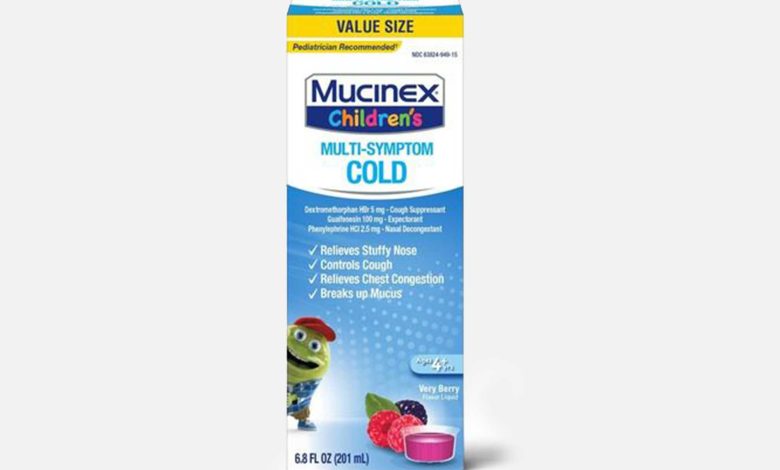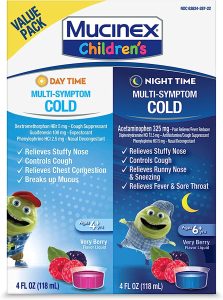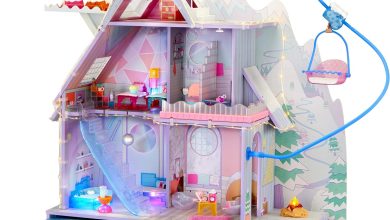No. 1 Mucinex For Kids: Safe Relief For Your Child’s Cold?

Fight back against colds with Mucinex for Kids. Safe, effective relief that lets your child rest and recover. Trust in Mucinex for their comfort. Mucinex for kids is an over-the-counter medication that helps relieve chest congestion. It thins and loosens mucus, making it easier for children to cough it up.
Mucinex for Kids is specially formulated to provide relief for children suffering from bothersome chest congestion. It contains the active ingredient guaifenesin, which is an expectorant that targets the buildup of mucus in the airways. The medication comes in a kid-friendly liquid form with dosage instructions based on the child’s age, ensuring safe and effective use.
Parents looking for a trusted remedy to ease their child’s cold symptoms can turn to Mucinex for Kids as part of their healthcare arsenal. Always consult a healthcare professional before administering any medication to ensure it’s suitable for your child’s specific needs.
Understanding Mucinex For Kids
Navigating the sea of cold medications can be a daunting task for any parent trying to find relief for their child’s cold symptoms. Enter Mucinex for Kids—a line of over-the-counter remedies designed to tackle the toughest stuffy noses, coughs, and chest congestion. Let’s dive into what Mucinex for Kids is, its active ingredients, and how it works against those pesky cold symptoms.
What is Mucinex?
Mucinex is a well-known brand that produces medications targeting respiratory issues. Notably, Mucinex for Kids is a tailored formula that offers symptom relief for children, striking a balance between efficacy and safety. The range includes syrups and chewable tablets, each formulated with careful consideration for younger patients.
Active Ingredients In Mucinex For Kids
Each Mucinex for Kids product contains specific active ingredients to target particular symptoms. Key components typically include:
- Guaifenesin: Guaifenesin is an expectorant that helps loosen and thin mucus, making it easier for children to cough it up.
- Dextromethorphan: Dextromethorphan is a cough suppressant that acts on the brain to reduce the urge to cough.
It’s important for parents to match their child’s symptoms with the correct Mucinex for Kids product to ensure optimal relief.
How Mucinex Relieves Cold Symptoms
Mucinex for Kids provides multi-symptom relief by employing its active ingredients in a targeted manner. The breakdown is as follows:
| Symptom | Active Ingredient | Action |
|---|---|---|
| Cough | Dextromethorphan | Suppresses cough reflex |
| Mucus build-up | Guaifenesin | Thins and loosens mucus |
By combining these actions, Mucinex for Kids can help alleviate the discomfort and symptoms associated with colds, making it a staple in the family medicine cabinet during the cold season.

Credit: www.riteaid.com
Mucinex Formulations For Children
When parents confront the challenge of treating their children’s cold and cough symptoms, Mucinex for Kids stands out as a trusted ally. Pediatric healthcare requires treatments formulated specifically for children’s unique needs. Mucinex recognizes this and provides options designed to alleviate discomfort and help little ones bounce back faster. With child-friendly flavors and dosage forms, Mucinex caters to the palates and safety profiles suitable for young patients.

Photo: Amazon
Differences In Adult Vs. Pediatric Formulas
The main differentiators between adult and pediatric Mucinex formulas lie in strength, dosage, and ingredients. Adult medications may contain higher concentrations of active ingredients, which are not safe for children’s developing bodies. Formulating a pediatric version involves careful consideration to ensure efficacy while minimizing potential side effects.
- Concentration: Lower active ingredient levels tailored to children.
- Safety: Additional safety measures, such as child-resistant packaging.
- Taste: Flavors that make medicine more palatable to children.
Age-specific Mucinex Products For Kids
Mucinex offers age-appropriate products to ensure children get the correct dose of medication for their age group. Labels clearly outline the appropriate age range for each product, helping parents and caregivers to administer the medication safely and effectively.
| Product | Age Range | Active Ingredient | Flavor |
|---|---|---|---|
| Mucinex Mini-Melts | 4-12 years | Guaifenesin | Orange Creme |
| Mucinex Children’s Liquid | 6+ years | Guaifenesin and Dextromethorphan | Berry |
| Mucinex Children’s Cold, Cough & Sore Throat | 4+ years | Multiple active ingredients | Very Berry |
Each Mucinex product for kids is evidence-based, ensuring safe and effective relief for the common cold and cough symptoms. Detailed instructions for use encourage responsible administration based on the child’s age and weight, advocating for a cautious approach to pediatric healthcare.
Safe Relief For Your Child’s Cold?
As the sniffles, coughs, and sneezes fill your home, it’s evident that the cold season has arrived, and so has the search for remedies that promise to help your little ones feel better. Parents often reach for Mucinex for Kids, a product trusted by many to relieve cold symptoms. Is Mucinex for Kids a safe option that can bring much-needed relief to your child? This essential guide will delve into what every parent needs to know regarding the suitability and precautions of using Mucinex for Kids to ensure your child’s safety and comfort during the cold season.
Analyzing The Safety Profile Of Mucinex For Kids
The priority for any parent is the well-being of their child. Mucinex for Kids is formulated specifically for children, with the active ingredient guaifenesin, which serves to loosen mucus and ease expectoration. But what about its safety profile?
- FDA-Approved: Guaifenesin, the key component of Mucinex for Kids, is an FDA-approved expectorant, indicating it has undergone rigorous testing for safety and efficacy.
- Age Consideration: This medication is suitable for children as young as four years old, but it’s not recommended for younger children without a doctor’s consent.
- Allergy Assessment: Always check the label for potential allergens to ensure your child does not have a reaction to any of its ingredients.
By keeping these factors in mind, parents can more confidently administer Mucinex for Kids when their children show symptoms of a cold.
Proper Dosage And Potential Side Effects
Adhering to the proper dosage of Mucinex for Kids is paramount to avoiding side effects and ensuring effectiveness. Over-the-counter medications can pose risks if not used according to the instructions.
| Age Group | Dosage | Frequency |
|---|---|---|
| 4 to 5 Years | 1 teaspoon (5 ml) | Every 4 hours |
| 6 to 11 Years | 2 teaspoons (10 ml) | Every 4 hours |
| 12 Years and Older | 4 teaspoons (20 ml) | Every 4 hours |
It’s crucial not to exceed the recommended dosage and to keep track of all medications consumed to prevent overuse.
- Dizziness or headaches may be experienced by some children as a side effect.
- Nausea or vomiting occasionally occurs but can typically be managed by taking the medication with food or a glass of water.
- Allergic reactions, though rare, can be serious. Signs include itching, swelling, and breathing difficulties.
If you observe any of the above or other unusual symptoms, discontinue use and consult your healthcare provider immediately.
Ultimately, when used carefully and as directed, Mucinex for Kids can offer significant relief for children suffering from nagging cold symptoms. Educated usage coupled with proper dosage adherence sets the stage for a safer, symptom-free path through the cold season.
Administering Mucinex To Children
When your child is grappling with a cough and chest congestion, Mucinex for Kids can offer some much-needed relief. Ensuring you administer this medication safely and correctly is crucial for it to be effective. Below we delve into a comprehensive guide on how to give Mucinex to your child, coupled with indispensable advice on when to seek guidance from a pediatrician.
Step-by-step Guide On Giving Mucinex Safely
To ensure your child gets the right dose of Mucinex and responds positively to the treatment, follow these steps:
- Verify the Dosage: Check the packaging for the correct dosage according to your child’s age and weight. Incorrect dosing could lead to reduced effectiveness or potential side effects.
- Measure Precisely: Use the dosing syringe or cup provided to measure the exact amount prescribed.
- Calm Explanation: Reassure your child about taking the medication and explain how it will help them feel better.
- Administer Carefully: Have your child sit upright to take the medication, reducing the risk of choking. Encourage them to sip slowly.
- Storage: Always store Mucinex out of children’s reach and at the appropriate temperature to maintain its efficacy.
When To Consult A Pediatrician Before Use
Before administering Mucinex, there are circumstances that warrant professional advice. Below are instances when you should consult a pediatrician:
- Underlying Health Conditions: If your child has chronic health issues, such as asthma or heart conditions, seek medical guidance before use.
- Allergic Reactions: Should your child have a history of allergies to medications, verify that Mucinex is safe for them.
- Persistent Symptoms: If symptoms do not improve or worsen after a few days of treatment, it’s essential to contact a pediatrician.
- Young Children: Mucinex is not recommended for children under a certain age. Confirm with a pediatrician if it’s suitable for your child.
Monitoring Mucinex Effectiveness
When your little one is battling a cold and cough, Mucinex for Kids can be a helpful ally to loosen troublesome mucus and ease their symptoms. However, knowing whether the medication is working effectively is key to managing their recovery. Tracking improvements and understanding when to seek further medical advice is crucial. Let’s explore the signs you should look for to determine the effectiveness of Mucinex in your child’s regimen and when to consult healthcare professionals for additional support.
Recognizing Signs Of Relief In Your Child
To determine whether Mucinex for Kids is providing the needed relief, observe your child closely for the following signs of improvement:
- Easing of Cough: A noticeable reduction in the frequency and intensity of your child’s cough is a clear indication that Mucinex is helping.
- Improved Breathing: Mucinex may help clear mucus blockages, which could make breathing easier for your child.
- Increased Comfort: Look for changes in your child’s comfort levels. If they seem more relaxed and less irritated by their symptoms, it’s a positive sign.
- Better Sleep Patterns: As symptoms subside, you may notice an improvement in sleep quality, with fewer interruptions due to coughing or congestion.
Monitor daily progress in a journal or note app to keep a concise record of symptoms and improvements.
When To Follow Up With Healthcare Providers
While Mucinex can be effective, it’s important to know when to seek additional medical attention:
- If symptoms persist beyond a week or worsen, despite the use of Mucinex.
- Should your child experience side effects that cause concern or discomfort.
- Whenever there’s uncertainty about the appropriateness of continued use of the medication.
Consult with your pediatrician if you’re unsure about the dosage or frequency of administration, or if you observe any unexpected changes in your child’s health. Keep emergency numbers and your healthcare provider’s contact information accessible should the need arise.
| Sign to Monitor | Observation Period |
|---|---|
| Reduction in Cough and Congestion | Within the first few doses |
| Breathing Ease | Continual improvement over several days |
| Sleep Quality | Improved within the first 2-3 nights |
| Overall Comfort and Behavior | Noticeable changes within a week |
In summary, vigilance is paramount when monitoring your child’s response to Mucinex. Recognize signs of relief promptly and be prepared to connect with healthcare providers if necessary.
Combating Cold With Home Remedies
When the cold season strikes, parents often reach for trusted over-the-counter remedies like Mucinex for Kids to help their little ones feel better. But alongside these effective treatments, many families also turn to time-honored home remedies to soothe symptoms and support recovery. Combating a cold doesn’t have to mean just medicine; it can also involve a synergy of natural treatments that work alongside Mucinex to provide comfort and relief for your child.
Complementing Mucinex With Natural Treatments
While Mucinex for Kids actively works to loosen mucus and relieve chest congestion, incorporating gentle, natural remedies can bolster healing and comfort. Here are some home strategies to try:
- Honey and Lemon Warm Drinks:
A mixture of honey and lemon in warm water can help soothe sore throats and coughs. Honey acts as a natural cough suppressant, while lemon adds a burst of vitamin C. - Salt-Water Gargle:
If your child is old enough to gargle, this time-tested method can reduce throat irritation and help fight bacteria. - Humidifier:
Adding moisture to the air with a humidifier can help relieve nasal congestion and make breathing easier, especially during sleep. - Eucalyptus Oil:
Used in a diffuser, eucalyptus oil can open up airways and has natural antibacterial properties.
Note: It’s vital to consult with a pediatrician before starting any home remedy, especially when combining them with over-the-counter medications like Mucinex.
Ensuring Overall Wellness During A Cold
Maintaining your child’s overall health is critical when they’re fighting off a cold. Here are several strategies to support their well-being:
| Wellness Aspect | Recommendations |
|---|---|
| Hydration | Ensure your child drinks plenty of fluids like water and juice to stay hydrated, making it easier to loosen mucus. |
| Rest | Encourage additional sleep and rest to allow their body to heal. |
| Nutritious Foods | Provide a balanced diet rich in vitamins and minerals to boost their immune system. |
| Hand Washing | Instill frequent hand washing to prevent the spread of germs. |
Remember, comfort is key during a cold. Warm baths, extra cuddles, and relaxing activities can go a long way in making your child feel better.

Photo: Youtube
Frequently Asked Questions On Mucinex For Kids
Is Mucinex Safe For Children To Use?
Mucinex has formulations specifically designed for children aged 4 and up. Always read the label and consult a healthcare provider before use to ensure safety and proper dosage.
What Symptoms Does Children’s Mucinex Treat?
Children’s Mucinex primarily relieves cough and helps to break up mucus, making it easier for your child to cough it out. It can also reduce chest congestion.
How Often Can Kids Take Mucinex?
Children’s Mucinex dosage varies by the product and the child’s age. Refer to the product’s instructions or consult with a pediatrician for an appropriate dosing schedule.
Can Toddlers Take Mucinex Products?
Mucinex products are generally recommended for children 4 years and older. Medications for toddlers should be discussed with a healthcare professional to ensure safety.
Can toddlers under 4 years old take Mucinex?
Mucinex is generally not recommended for children under 4 years old. Always consult a pediatrician before giving any medication to a toddler.
What do Children’s Mucinex Cough and Congestion Treat?
It is designed to relieve cough and congestion symptoms in children. It helps loosen mucus and makes coughs more productive.
What is the recommended dosage for Children’s Mucinex?
The dosage depends on the child’s age and weight. Always follow the dosing instructions on the package or as directed by a healthcare professional.
What symptoms does Mucinex Children’s Multi-Symptom Cold relieve?
It targets multiple symptoms of a cold, including cough, sore throat, nasal congestion, and fever.
Is Mucinex Children’s effective for cold and flu symptoms?
Yes, it is formulated to alleviate symptoms associated with the common cold and flu, such as cough, congestion, and fever.
How should I dose Mucinex Children’s Multi-Symptom Cold?
Dosage is based on the child’s age and weight. Refer to the product label for specific dosing guidelines or consult with a healthcare provider.
What are the active ingredients in Children’s Mucinex?
Common active ingredients include guaifenesin for chest congestion and dextromethorphan for cough relief. Ingredients may vary based on the specific product.
How is Mucinex Multi-Symptom Cold dosage determined by weight?
Dosage for children is often determined by weight to ensure safety and effectiveness. The product label or a healthcare provider can provide specific dosing instructions based on a child’s weight.
Conclusion
Navigating children’s cold and cough relief with Mucinex allows for easier breathing and restful nights. For parents seeking effective over-the-counter options, Mucinex for Kids stands out. Always consult a pediatrician before starting any medication, ensuring safety and correct dosage. Remember, a healthy recovery is just a dose away.

Tanjer, with over a decade of experience in parenting and child development, is renowned for his expertise in these fields. His work, deeply rooted in research and practical application, focuses on nurturing young minds and fostering a love for learning. Tanjer’s approach, characterized by empathy and tailored advice, aims to positively impact the lives of children and their families.


